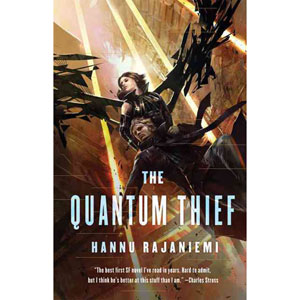
Published by Tor on May 10, 2011
As you might suspect from the title, the story told in The Quantum Thief involves a thief. The thief's current identity is Jean le Flambeur (his past identities are something of a mystery, even to him). The novel opens with Jean escaping from a Dilemma Prison, busted out by Mieli (with an assist from her artificially intelligent ship) so that Jean can carry out an assignment for Mieli. She takes him to the Moving City of the Oubliette on Mars, where Jean's storyline intersects a couple of others: Isidore Beautrelet's investigation of a murder that resulted from pirating the victim's gogol (essentially, the uploading and enslavement of his mind), and Raymonde's attempt to get to the bottom of an apparent political conspiracy that jeopardizes the ideals of freedom and privacy upon which the Oubliette was founded. Along the way the reader discovers that the relationships among the primary characters are complex if not Byzantine.
The Quantum Thief is filled with richly inventive ideas. I particularly like the notion of using Time as currency: when a person's allocated Time in Oubliette has all been spent, his body dies (to be held in storage pending resurrection) while his gogol becomes part of a collective that keeps the city functioning. Another intriguing concept is the ability to make memories private or public, to share them selectively with others. Fun stuff, but ideas alone do not a novel make. A common flaw in hard science fiction is a lack of balance between the science and the fiction, with ample attention given to futuristic concepts but not enough to the demands of storytelling: a coherent plot, fully developed characters, dramatic tension, credible dialog, and the like. I was pleasantly surprised to find that Hannu Rajaniemi crafted a novel that gives due attention to these requirements. His characters have intriguing personalities, the story is carefully paced and the storylines come together nicely at the end. The novel is a skillful blend of science fiction and political thriller. The ending is a bit abrupt, the solutions to the novel's many mysteries seemingly jammed together in the last few pages, but overall The Quantum Thief tells an entertaining, capably crafted story that explores the themes of freedom and privacy in a thought-provoking manner. The ending also leaves open the possibility of (and practically invites) a sequel.
The novel employs a number of terms that are defined only by their context, a technique that avoids pace-slowing exposition but risks confusion to the extent that their meaning is unclear. I happened upon a Glossary of terms in The Quantum Thief in Wikipedia that struggling readers might find helpful. Readers who prefer to puzzle it out for themselves, or who simply have a more intuitive understanding of invented terminology than I do, probably regard reliance on the glossary as cheating, but I was grateful for its existence. Because the novel covers such unfamiliar ground, I found it made for tough sledding at times; occasionally I had to reread paragraphs before I could absorb them fully. I don't say that to put readers off; on the contrary, difficult novels are often more rewarding than easy ones, and that is true of The Quantum Thief. In any event, after awhile the brain adjusts and the world Rajaniemi created starts to become recognizable. I recommend the novel to fans of hard sf and I look forward to seeing more from Rajaniemi.
RECOMMENDED